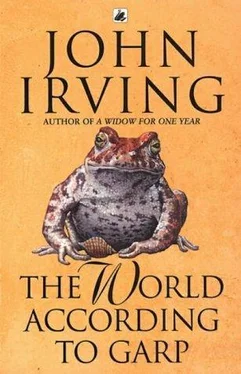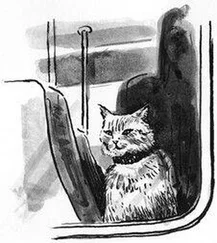“Well, after death,” Midge Steering Percy told the children—little Garp, too—"we all go to a big house , sort of like this one.”
“But bigger ,” Stewie Two said, seriously.
“I hope so,” said William, worriedly.
Dopey didn't get what was meant. Pooh was not old enough to talk. Cushie said she didn't believe it—only God knows where she went.
Garp thought of the vast, grand Steering family house—now for sale. He realized that he wanted to buy it.
“Mr. Smoans?” Midge nudged him.
“Uh,” Garp said.
“The coffin, Jack,” whispered the hearse driver. Stewie Two, bulging beside him, looked seriously toward the enormous casket that now housed the debris of his father.
“We need four,” the driver said. “At least four.”
“No, I can take one side myself,” Garp said.
“Mr. Smoans looks very strong,” Midge said. “Not very large , but strong.”
“Mother,” Stewie Two said.
“Yes, yes, Stewart,” she said.
“We need four. That's all there is to it,” the driver said.
Garp didn't believe it. He could lift it.
“You two on the other side,” he said, “and up she goes.”
A frail mutter reached Garp from the mourners at Fat Stew's funeral, aghast at the apparently unmovable casket. But Garp believed in himself. It was just death in there; of course it would be heavy—the weight of his mother, Jenny Fields, the weight of Ernie Holm, and of little Walt (who was the heaviest of all). God knows what they all weighed together, but Garp planted himself on one side of Fat Stew's gray gunboat of a coffin. He was ready.
It was Dean Bodger who volunteered to be the necessary fourth.
“I never thought you'd be here,” Bodger whispered to Garp.
“Do you know Mr. Smoans?” Midge asked the dean.
“Smoans, ’61,” Garp said.
“Oh yes, Smoans , of course,” Bodger said. And the catcher of pigeons, the bandy-legged sheriff of the Steering School, lifted his share of the coffin with Garp and the others. Thus they launched Fat Stew into another life. Or into another house, hopefully bigger.
Bodger and Garp trailed behind the stragglers limping and tottering to the cars that would transport them to the Steering cemetery. When the aged audience was no more around them, Bodger took Garp to Buster's Snack and Grill, where they sat over coffee. Bodger apparently accepted that it was Garp's habit to disguise his sex in the evening and change his name during the day.
“Ah, Smoans,” Bodger said. “Perhaps now your life will settle down and you'll be happy and prosperous.”
“At least prosperous,” Garp said.
Garp had completely forgotten to ask the organist not to repeat Fat Stew's music for Ernie Holm. Garp hadn't noticed the music, anyway; he wouldn't recognize it if it were repeated. And Helen hadn't been there; she wouldn't know the difference. Neither, Garp knew, would Ernie.
“Why don't you stay with us awhile?” Bodger asked Garp; with his strong, pudgy hand, sweeping the bleary windows in Buster's Snack and Grill, the dean indicated the campus of the Steering School. “We're not a bad place, really,” he said.
“You're the only place I know,” Garp said, neutrally.
Garp knew that his mother had chosen Steering once, at least for a place to bring up children. And Jenny Fields, Garp knew, had right instincts. He drank his coffee and shook Dean Bodger's hand affectionately. Garp had one more funeral to get through. Then, with Helen, he would consider the future.
18. HABITS OF THE UNDER TOAD
ALTHOUGH she received a most cordial invitation from the Department of English, Helen was not sure about teaching at the Steering School.
“I thought you wanted to teach again,” Garp said, but Helen would wait awhile before accepting a job at the school where girls were not admitted when she was a girl.
“Perhaps, when Jenny's old enough to go,” Helen said. “Meanwhile, I'm happy to read, just read.” As a writer, Garp was both envious and mistrustful of people who read as much as Helen.
And they were both developing a fearfulness that worried them; here they were, thinking so cautiously about their lives, as if they were truly old people. Of course Garp had always had this obsession about protecting his children; now, at last, he saw that Jenny Fields' old notion of wanting to continue living with her son was not so abnormal after all.
The Garps would stay at Steering. They had all the money they would ever need; Helen didn't have to do anything, if she didn't want to. But Garp needed something to do.
“You're going to write,” Helen said, tiredly.
“Not for a while,” Garp said. “Maybe never again. At least not for a while.”
This really did strike Helen as a sign of rather premature senility, but she had come to share his anxiousness—his desire to keep what he had, including sanity—and she knew that he shared with her the vulnerability of conjugal love.
She did not say anything to him when he went to the Steering Athletic Department and offered himself as Ernie Holm's replacement. “You don't have to pay me,” he told them. “Money doesn't matter to me; I just want to be the wrestling coach.” Of course they had to admit he would do a decent job. What had been a strong program would begin to slump without a replacement for Ernie.
“You don't want any money?” the chairman of the Athletic Department asked him.
“I don't need any money,” Garp told him. “What I need is something to do —something that's not writing.” Except for Helen, no one knew that there were only two things in this world that T. S. Garp ever learned to do: he could write and he could wrestle.
Helen was perhaps the only one who knew why he couldn't (at the moment) write. Her theory would later be expressed by the critic A. J. Harms, who claimed that Garp's work was progressively weakened by its closer and closer parallels to his personal history. “As he became more autobiographical, his writing grew narrower; also, he became less comfortable about doing it. It was as if he knew that not only was the work more personally painful to him—this memory dredging—but the work was slimmer and less imaginative in every way,” Harms wrote. Garp had lost the freedom of imagining life truly, which he had so early promised himself, and us all, with the brilliance of “The Pension Grillparzer.” According to Harms, Garp could now be truthful only by remembering , and that method—as distinct from imagining—was not only psychologically harmful to him but far less fruitful.
But the hindsight of Harms is easy; Helen knew this was Garp's problem the day he accepted the job as wrestling coach at the Steering School. He would be nowhere near as good as Ernie, they both knew, but he would run a respectable program and Garp's wrestlers would always win more than they would lose.
“Try fairy tales,” Helen suggested; she thought of his writing more often than he did. “Try making something up, the whole thing—completely made up.” She never said, “Like “The Pension Grillparzer""; she never mentioned it, although she knew that he now agreed with her: it was the best he had done. Sadly, it had been the first.
Whenever Garp would try to write, he would see only the dull, undeveloped facts of his personal life: the gray parking lot in New Hampshire, the stillness of Walt's small body, the hunters' glossy coats and their red caps—and the sexless, self-righteous fanaticism of Pooh Percy. Those images went nowhere. He spent a great deal of time fussing with his new house.
Midge Steering Percy never knew who bought her family's mansion, and her gift to the Steering School. If Stewie Two ever found it out, he was at least smart enough never to tell his mother, whose memory of Garp was clouded by her fresher memory of the nice Mr. Smoans. Midge Steering Percy died in a nursing home in Pittsburgh; because of what Stewie Two had to do with aluminum, he had moved his mother into a nursing home not far from where all that metal was made.
Читать дальше












